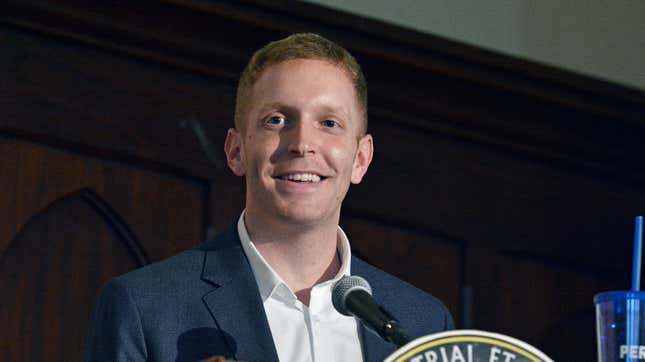Congressional Candidate Is Sorry Not Sorry
Politics

On Sunday evening, Alex Morse, the 31-year-old openly gay mayor of Holyoke, Massachusetts, issued what can loosely be termed an apology after news emerged that the College Democrats of Massachusetts had accused him of “inappropriate sexual relations with college students.” And his apology, if it can be called that, leaves a lot to be desired.
UMass’s student newspaper the Massachusetts Daily Collegian first reported last Friday that Morse, who’s running a progressive campaign for Congress backed by groups like Justice Democrats and MoveOn, has a history of what the paper described as “inappropriate sexual relations with college students before and during his congressional campaign.” The allegations come from a letter the College Democrats of Massachusetts sent to Morse last Thursday, in which they wrote that Morse used “his position of power for romantic or sexual gain” and that “[n]umerous incidents over the course of several years have shown that it is no longer appropriate to encourage interaction between College Democrats and Alex Morse.”
More on Morse’s alleged behavior, from the Massachusetts Daily Collegian:
The behavior in question centered on three issues:
The first issue alleges that Morse regularly matched with students on dating apps, including Tinder and Grindr, who were as young as 18 years old. These students included members of the College Democrats of Massachusetts, UMass Amherst Democrats and other groups in the state.
The second issue, “Using College Democrats events to meet college students and add them on Instagram, adding them to his ‘Close Friends’ story and DMing them, both of which have made young college students uncomfortable,” according to the letter.
“We have heard countless stories of Morse adding students to his ‘Close Friends Story’ and Direct Messaging members of College Democrats on Instagram in a way that makes these students feel pressured to respond due to his status,” the letter read.
The third issue: “Having sexual contact with college students, including at UMass Amherst, where he teaches, and the greater Five College Consortium.”
On Sunday, the College Democrats of Massachusetts issued a public statement in which the group wrote that their initial letter “was written at the direct request of those affected by [Morse’s] behavior.” And the group made it clear why they believe Morse abused his power, putting students in an incredibly tricky position:
-

-

-

-

-

-

-

-

-

-

-

-

-

-

-

-

-

-

-

-

-

-

-

-

-

-

-

-

-

-

-

-

-

-

-

-

-

-

-

-








































